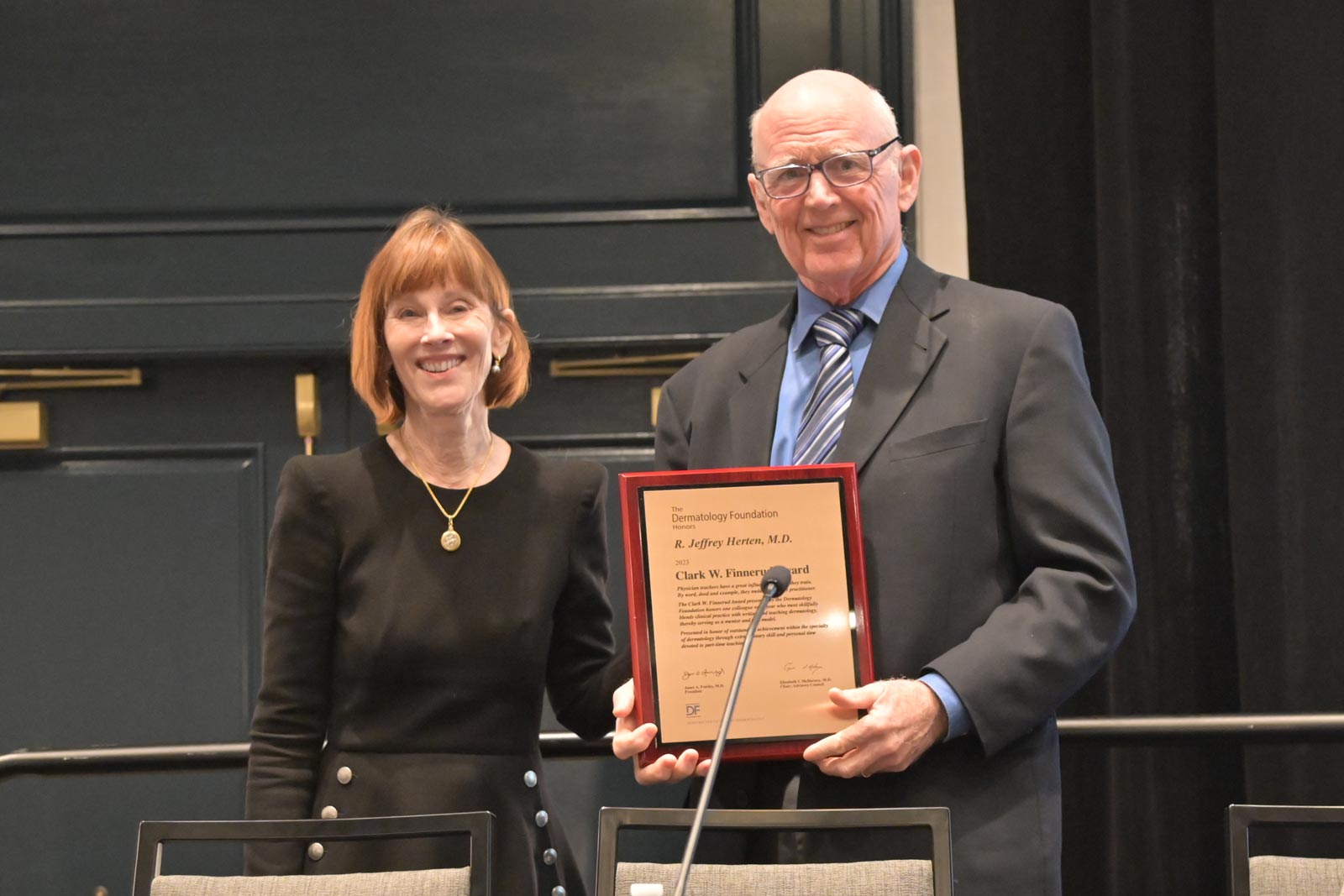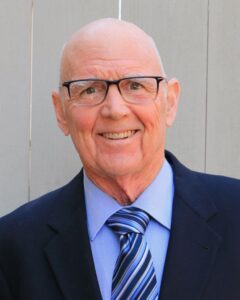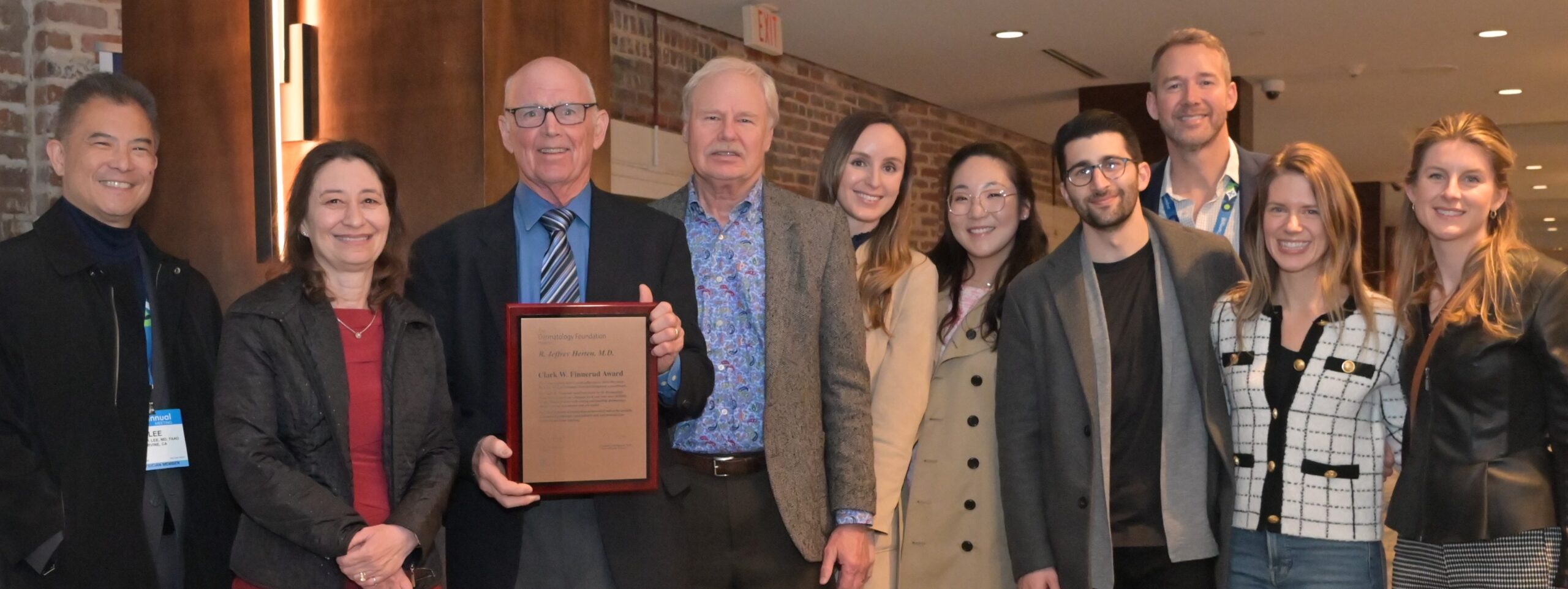In Step With Patients and Residents
Jeffrey Herten, MD, 2023 DF Clark W. Finnerud Award
March 2024


R. Jeffrey Herten, MD, 2023 recipient of the DF Clark W. Finnerud Award.
For more than 40 years, whether in a clinical setting or within university walls, Dr. Jeffrey Herten, the 2023 DF Clark W. Finnerud Award recipient, has been able to convey his love of the specialty and his compassion towards patients.
He graduated from the Medical School of the University of California, Irvine, (UCI) in 1972 as a Regents Scholar; he did his internship in internal medicine at Los Angeles County-USC Medical Center.
DF Clark W. Finnerud Award: What it takes
The Clark W. Finnerud Award honors dermatologists who are part-time clinicians and part-time teachers. Established in 1971, the award bears the name of the late Dr. Clark W. Finnerud, a dedicated teacher and clinician who served the Rush Medical School for 47 years. This award honors not only part-time teachers but also Dr. Finnerud for his achievements, foresight, and generosity.
His interest in dermatology developed during a one-month rotation when he was a senior internal medicine student. “I liked the clinical diagnosis-dermatopathology process, the immediacy of it,” he says.
He was a resident at UCI and a fellowship in dermatopathology followed under the mentorship of Dr. James Graham, who was the Director of Dermatopathology at Scripps Clinic and Research Foundation at the time.
Dr. Herten subsequently became a full-time faculty member at UCI. He loved teaching and UCI but wanted to move to San Luis Obispo.
He and Dr. Graham landed on a solution that worked for UCI, allowing Dr. Herten to begin his clinical career. He would work at the San Luis Obispo Medical Clinic and teach part-time at UCI. It seemed to be the best of both worlds.
Each week for the next five years, Dr. Herten woke up at 3 a.m. in his home in San Luis Obispo, California, to drive to the Tibor Rubin VA Medical Center in Long Island.
Each week for the next five years, Dr. Herten woke up at 3 a.m. in his home in San Luis Obispo, California, and drove four hours to the Tibor Rubin VA Medical Center in Long Beach, where he was an attending physician. Every other Friday for 15 years after that, he took the same route to volunteer at UCI to teach residents.
Once established in his new surroundings, Dr. Herten realized that working at the clinic did not suit him. And so, in 1977, he opened the San Luis Dermatology Clinic. “I rented a small two-exam-room office and put up my shingle,” he said. He began seeing patients, many of whom doctors who weren’t associated with the San Luis Obispo Medical Clinic, referred to him.
It didn’t take long for his practice to grow.
Call and response
Dr. Herten credits Drs. Ron Barr and James Graham, with nurturing his skills, deepening his knowledge, and teaching the art of presentation. They shaped his career.
He believes dermatology lends itself to teaching. The first skin assessment is a visual examination that precludes what he calls “a sophisticated test” that may be time-consuming; patients wait for results, and residents wait to learn.

Nine of Dr. Herten’s former residents attended the awards ceremony, and another 20 were present at the UCI reunion.
“Residents in family medicine come to my clinic and, in the presence of a patient, they describe the features of the skin disorder, and then offer their diagnosis and treatment,” he said. “As a teacher, I either reinforce their thinking or ask them to consider an alternative diagnosis.”
He considers the feedback loop an essential learning tool and believes a clinical professor or an attending physician’s job is to help mold residents’ clinical judgment so that they’re constantly adding to their knowledge base.
Learning from patients
“I have a patient who has dysplastic nevus syndrome, and I’ve been treating her for as long as I’ve been in practice,” he said. “She has had seven melanomas but has never had a serious problem because we caught them all early. She is probably the patient that has taught me the most.”
One of her children has dysplastic nevus syndrome as well and has become a dermatologist. He is now a surgeon in Dr. Herten’s practice.
In the early 2000s, Dr. Herten was medical director at the Liberty Tattoo Removal Clinic in San Luis Obispo Dermatology Clinic. It was a volunteer clinic established to remove anti-social tattoos for parolees, and former gang members, among others.
Dr. Herten appreciates his patient relationships. Understanding patient concerns regarding their noticeable skin disorder requires building trust; conversations sometimes delve into the personal.
His experience at a free clinic illustrates this argument. In the early 2000s, Dr. Herten was medical director at the Liberty Tattoo Removal Clinic in San Luis Obispo Dermatology Clinic. It was a volunteer clinic established to remove anti-social tattoos for parolees, and former gang members, among others.
“Often, people needed to remove tattoos that could keep them from getting that next job,” he said.
One of his patients had a tattoo inscribed on her chest that read “Billy’s girl”; a symbol of her past that she wanted removed. “I remember she broke down and cried during the last treatment.”
The clinic shut down during Covid, and he is actively trying to resurrect it.
Dr. Herten continues to work two and a half days a week at the School of Medicine. “I love teaching. I love my patients. I love my job.”
Select offices held
Fellow of the American Academy of Dermatology. 1977- Present
Fellow of the American Academy of Dermatopathology. 1979-Present
Fellow of the American Society of Dermatologic Surgery. 1981-Present
Member of the Tri-County Dermatologic Society. 1983-Present
Secretary-Treasurer, Tri-County Dermatologic Society. 1990-92
President, Tri-County Dermatologic Society. 1992-93
Select awards
Dermatopathology Teacher of the Year, University of California, Irvine. 1999-2000
Dermatology Teacher of the Year, University of California, Irvine. 2003-2004
Dermatology Teacher of the Year, University of California, Irvine, 2007-2008
Dermatology Clinical Volunteer Faculty Teacher of the Year, University of California, Irvine, 2010-2011
Learn more about the DF Honorary Awards.

